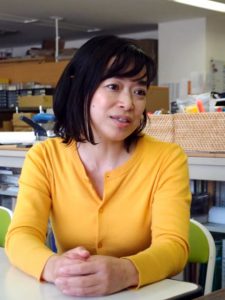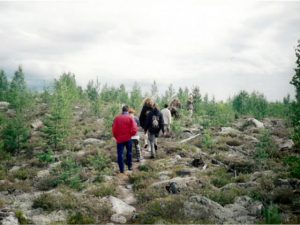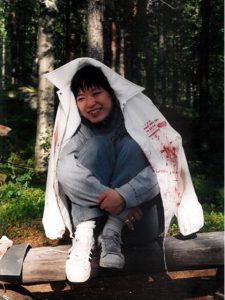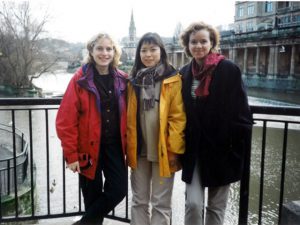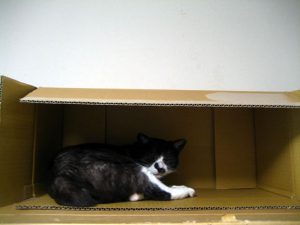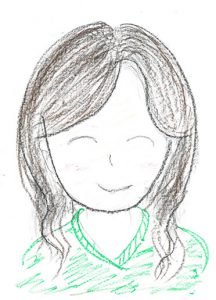[Original by Haruka SHIMIZU, 2015 Public Relations Intern (June16, 2016); Translated by Y. Nakamura/R. Florea]
[*Ms. Watanabe is concurrently appointed to the Manager for the Community Development Group as from July 2017.]
Hello, my name is Haruka Shimizu. I am a PR intern for JVC. I will interview today Ms. Naoko Watanabe in charge of the South Africa Project. Mr. Shirakawa recommended her as the most beautiful woman of JVC in the last staff interview. We, PR interns, are also talking about her; “She is too charming!” Why did she take part in the field of international cooperation and South Africa? I’m looking forward to talking with her about many things!
What led you to work in the field of international cooperation?
There were two incidents in my high-school days. One of them was the Gulf War. I was shocked to see the news, where local people were crying. It made me sympathize with them and feel that I wanted to help them. Moreover, it led me to think about the reason why such an incident happened. As a high-school student, I seriously thought about how we could build a society where no war would occur. However, I never thought of connecting these concerns with my future occupation. Only the image of people, who helped people in local places, left a strong impression on my mind. I wondered who they were and what the world looked like from their points of view.
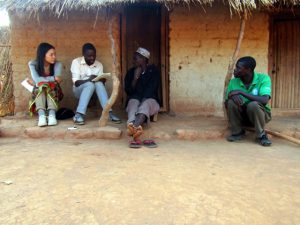
Ms. Watanabe (left) was listening to local farmers in an investigation in Mozambique. She is now travelling around the world.
Another incident happened just around the same time. I grew up in a rural district in Aichi prefecture. Graveyards, paddy fields, and schools surrounded my house. One day the graveyards and paddy fields were destroyed and replaced with a new roadway. There was a sidewalk that elementary school students used. Our teacher told us to make a bow to graveyards when passing them. I was somehow awed by the graveyards since my childhood. Although I was a child, I felt they were precious places where ancestors slept. Therefore, it was a terrible blow to me that the graveyards were demolished. It shocked me a lot that those precious places, where the dead slept and which the neighbors frequently visited, were demolished and replaced just for the purpose of building a road. At that time I just thought about why I or anyone else had not said, “I would not accept it,” or “I am bothered by the replacement.” The automobile industry was successful in Aichi prefecture and the new roadway would benefit people. But I had a doubt about the fact that this incident was simply caused by convenience.
I wondered if the war reported in news media and the incident happened to me were caused by people who had the same way of thinking. They do not hesitate to rob others of precious things for their own self-interest. I further thought that these incidents would happen in a similar type of society, where greedy or influential persons decide everything based on convenience or efficiency, not justice. I am not sure if this thought was correct, but it was the instance that the Gulf War, which I watched on news programs, was connected to my own experience.
What did you study at university?
I did not study hard in senior high school, but fortunately passed an entrance examination of a university and entered the department of English language and literature. Looking back now, I can say that I should study harder, but at that time I did not know what and why I study. I was an absent-minded girl (she laughs). Frankly speaking, after entering university, I was more interested in participating in extracurricular club activities and doing part-time jobs than studying. I wanted to play sports in my university days. However, I felt it hard to join a club of tennis, basketball, or volleyball, because there were a lot of experienced club-mates. I chose lacrosse. But it was not because I had something to do with it. A senior member of the lacrosse club asked me to join the club on the campus, probably because I wore socks and sneakers. Other first-year students were so fashionable as to wear high heels (she laughs). The club had only four members and the top senior students were in the third year. That year more than ten first-year students joined the club including me. We aimed at making our club a member of the association of sports-oriented clubs and tried hard to accomplish it. My club mates had experiences in physical training clubs at high school. I noticed that I made a mistake (she laughs). I was not a good player, the training was so tough, but it made me ambitious. I also found good friends who are still very precious to me. After graduating from university, I heard that the club was approved as an official member of the association of sports-oriented clubs.
What was your destination after graduation from university?
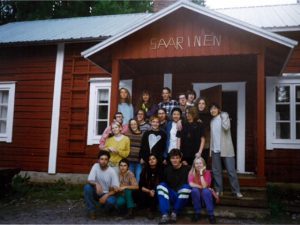
A photo at the time of doing volunteer work in Finland. She spent her time together with group members of the same age who had various backgrounds. It expanded her view toward the world.
It was just after the bubble economy burst, and I belonged to the generation of baby boomers. There was severe shortage of employment. I had rarely thought about my future until then. My classmates suddenly changed the color of their hair to black and their costumes to the style called “recruit suits.” They started to seek employment, but I couldn’t. I tried to find a job and attended an interview. However, I finally decided to stop it, because I preferred doing nothing instead of lying about the reason why I chose the company! I thought again, “What would I like to do?” and remembered the two incidents in my high school days. I talked to my parents about my thought. They responded to me, “You have lived a straight life until now. You had better take a rest once in order to have time to think,” and affectionately watched me. I spent days in a private university by living in a lodging, which required large amount of money. My parents paid for it, letting me free to live my life. I truly thank them for it.
While saving money by doing a part-time job after graduation from university, I had been engaged in a restoration project of forests affected by acid rain in the Czech Republic, Finland and so on for several months. I was not specifically interested in these areas or issues. I also applied for projects in the Middle East and Africa like Kenya and Morocco, but the restoration project was the only one open to me at that time. It was a hard task that required physical strength, for example, cutting down damaged trees, but I enjoyed it, since people of the same generation gathered in this project from the world. We were around the same age, but had a variety of life and experiences. It inspired me to think, “It is all right even if I cannot find a job immediately after graduation from university (she laughs).” I began to consider either working for an NGO or going to graduate school.
Thereafter I fortunately worked at the UK’s NGO of protecting marine life for one and a half year. I had no knowledge of marine life but naturally loved animals. I was interested in protecting animals and their habitats, because I wondered since my high-school days that the nature was being destroyed by development. I asked my parents in Japan to send me various books including a pictorial book of whales. I learned them but completely forgot it now. I was warmly welcomed by the organization, which had a splendid atmosphere. There were many wonderful persons who left some work to me and carefully helped me at any time. I was fully satisfied and had a good time with them.
What did you do after returning from the UK?
I entered graduate school in Japan. There were many graduate schools famous for environmental and development studies in the UK. My colleagues also graduated from such schools and recommended me to enter one of them. When thinking about the issue of environmental protection, however, I strongly felt that it was a matter of human beings and society. Instead of getting knowledge, I preferred to learn about the way of understanding society and tackling social problems. I eventually thought that mother tongue is the best for such studies.
I did fieldwork in a village in a mountain, where a dam was going to be constructed in a river. There were villages along each branch of the river. A small village clearly said “NO” to the dam construction and it finally stopped the project. I was learning at that time about the environmental issues of development projects from a sociological point of view. What I learned in graduate school is strongly connected to my activities at JVC as well as to my current involvement in the ProSAVANA Project in Mozambique.
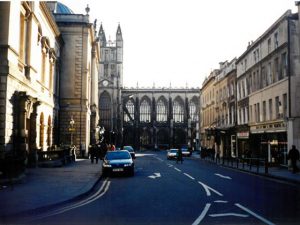
Bath is a beautiful place, where she spent her days in the UK. UNESCO registered the whole city as a World Heritage Site.
“An issue” looks completely different, depending upon the viewpoint of a person. I ask myself, why do I stand for the viewpoint. If people say “no”, what is their logic? What is connected with the logic in their society? I was not a good student, but I got experiences to think things from various points of view. These experiences are very important when I think about the situation of local people and politics.
Why did you join JVC?
After working at an NGO and learning in graduate school, I wanted to return to the field of NGO. It might be because of my experience in high school days that I could not raise my voice against the demolition of graveyards. Due to this experience, I was very much interested in the voice of people who cannot appeal to society. I wanted to see the world from their viewpoints and make a society where the voices of people are properly reflected. I became aware that NGOs would make these things possible. While investigating NGOs, I came to find JVC. I participated in the orientation and watched a video introducing JVC. I was impressed by the talk by Ms. Masako Hoshino, an adviser and former secretary general when JVC was established. She said, “JVC cannot survive, if it loses hesitation.” There were many other things with which I could really sympathize. As always (she laughs), I had no preference and didn’t care about which country I would be involved in. I could rather work in a domestic field considering my background in graduate school. Fortunately, I could join JVC and be involved in South Africa Project. Soon I became very fond of Africa!
Do you have any African goods at home?
Yes, I have! I love African baskets. I have a lot of them, which I bought in Mozambique, Zimbabwe and in South Africa. My mother got angry with me by saying, “How many baskets do you really want to buy?” I bought some of them for my cats (she now lives with seven cats including one whom she temporarily protects!). My cats do not like to sleep in baskets and prefer old corrugated cartons. In addition, I have a djembe, which I bought to learn playing, but never tried yet. There are lots of wooden plates as well as small goods!
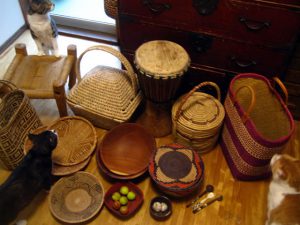
There are many more goods, too! She used the chair (left top) in a refugee camp in Sudan and brought it back to Japan. She uses everything except the djembe. Her cats took part in the photo.
What was the happiest moment you experienced in doing this job?
The South Africans were called “pitiful black people” at that time, since they were discriminated by the apartheid policy. Even in the restoration period after democratization in 1994, they were continuously provided with assistance. Most of them were engaged in agriculture or livestock farming and came to work in urban areas. They worked in mines owned by white people or worked as housekeepers. Assistance only concentrated on urban areas. JVC found it necessary to restore rural areas so that South African people could secure their livelihood. We started the training of environmentally preserved agriculture, the so-called organic agriculture, in the beginning of 2000. We considered that it was important not only to improve their livelihood but also to restore their self-confidence and dignity, which were lost in the days of apartheid. For that purpose, they should make use of their own resources and recover confidence. We, NGOs, cannot stay with them forever. We therefore started our activities with local trainers, who sympathized with our thoughts.
However, former small-scale agriculture by black people was already destroyed during apartheid. The role model of agriculture in South Africa was a large-scale farm run by white people. The local people claimed like “We cannot work without water. We need tractors. Please buy seeds, chemical fertilizer, and agricultural chemicals.” There were no “farmers” after their agriculture had been destroyed. It was so hard to find a person who approved our policy and worked together with us. Likewise, it was really hard to fix our practice in the villages. It took very long time until the number of villagers, who practiced our method, increased. I participated in the middle of the activities in 2005. The villagers still asked us this and that. However, at the final assessment review in 2009, they told me, “Even if JVC stops helping us, it would not cause trouble, since we can do things by ourselves. However, we are not very sure about what we do. Please come back here sometimes to see us and enjoy staying as our friend.” I was so happy to know that they accepted me as a human being regardless of the relationship between those who helped and those who were helped. I still keep in touch with them, although it passed five years after the project ended. It encourages me to see how they practice what they learned and expand it to other villages.
At the assessment review, I also asked a woman about how she changed through activities. I was really pleased to hear her reply, “I became a human.” South African people are really philosophical as I heard similar messages in other cases. Ii is great to see a change in persons who worked together with us. I heard many lovely words from persons whom I met during our activities. It always made me learn and think about various things. I have worked ten years while worrying, but I was always encouraged by the messages of the people I met. Their words helped me to get various viewpoints. Although there are some persons whom I don’t like (she laughs), there are so many people whom I respect. They always inspire me.
[My impression after interview]
I really enjoyed listening to her stories! This interview was a dream came true to me. She is very thoughtful and has a strong will to deliver the voices of persons who cannot raise voices. It makes her very attractive. I reconfirmed that she is my idol.
[Notice to next interview!]
Next time I will interview a staff member, whose charming point relies on her gentle smile! Please don’t miss it!
* The order of uploading the English version of “Staff Interview” is random and hence different from the order of the original Japanese version. We are sorry, but the person coming next may be different from the “next person to be interviewed” mentioned in the text.
Share This:
